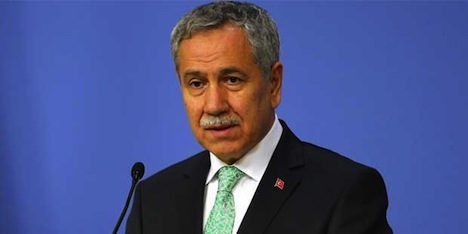It’s Wednesday, and Turkey’s pulled back from the brink of political chaos that engulfed it over the weekend.
![]()
That’s in large part to the efforts of Bülent Arınç (pictured above), Turkey’s deputy prime minister, whose attempts to bring the level of confrontation between Turkey’s government and protesters in Gezi Park near Istanbul’s Taksim Square and beyond have been successful where the Turkish prime minister, Recep Tayyip Erdoğan, has failed.
Erdoğan, who is out of the country this week, flew to Morocco on Monday and will be in Algeria and Tunisia until Thursday, may have been lucky in his timing, as Arınç has been acting prime minister this week. His absence from the country has been fortuitous, given the fact that his statements in response to the weekend’s crescendo of protests has been defiant in virtually every respect after turning police onto protesters in Taksim Square with brute force and tear gas before ultimately pulling police back. Whether it’s a concerted ‘good cop / bad cop’ venture or not, it’s a welcome breather in what had until Monday had been some of the most difficult moments of Erdoğan’s government since his first election in 2002.
Arınç, in contrast, has made all the right moves to protesters that Erdoğan could not last week and through the tumultuous weekend that saw two deaths and around 1,000 injuries in protests that expanded from Taksim Square to all of Turkey. He’s apologized on behalf of his government for excessive police force, he’s admitted that the initial protests were ‘rightful and legitimate.’ Though DİSK (Confederation of Progressive Trade Unions of Turkey) and KESK (Confederation of Public Workers’ Unions), two of the four major labor unions in Turkey, will officially join the protests today with strikes, Arınç has for the time being successfully defused the political crisis. The protests will continue, but by acknowledging the fundamental rights of Turkish protesters to gather, Arınç has averted Turkey from a wider confrontation — for now.
Arınç helped found the current governing party, the Adalet ve Kalkınma Partisi (AKP, the Justice and Development Party), an Islamist and socially conservative, albeit economically neoliberal, party. He was the speaker of Turkey’s Türkiye Büyük Millet Meclisi (Grand National Parliament of Turkey) from 2002 to 2007, and since 2009, he’s been a member of Erdoğan’s cabinet as one of three deputy prime ministers and the minister in charge of Turkey’s state radio and television company.
The conciliatory steps came largely in concert with the statements of Turkey’s president, Abdullah Gül, himself a former foreign minister and top official in Erdoğan’s past governments. In recent days, Gül has also taken a more conciliatory view of the protests, in contrast to Erdoğan, who hopes to succeed Gül next year in Turkey’s presidential election. Though Gül cannot run for reelection, Erdoğan hopes to transition from leading the Turkish government to assuming a presidency with enhanced powers. Though Gül, Erdoğan and Arınç are allies, Gül and Arınç have obviously chosen to respond to the protests in a manner quite differently than Erdoğan, and they are set to meet some of the protesters later this week while Erdoğan remains in North Africa.
Gül on Monday essentially praised the protesters for asserting their rights, and he noted that democracy means more than just the act of voting a government into power, adding that Turkey’s leaders had received the message.
Despite their statements, Erdoğan remains the prime minister, and others remains unconvinced, with good reason, of Arınç’s mea culpa, during which he noted that the Turkish government could have shut down Twitter (but judiciously chose not to), demonstrating that Arınç may not have quite fully taken on board the message of Turkey’s protesters. Arınç is certainly no liberal, and he may well be taking his stance solely due to internal AKP politics — the events of the past week in Taksim Square and Erdoğan’s response have put a damper on his presidential plans. The proof of the pudding is in the eating, and the next key moment is Friday, when Erdoğan returns to the country. Even though the demonstrations and strikes will continue today and tomorrow at a relatively reduced tension, and Erdoğan’s opponents have truly substantive critiques about the level of freedom (especially with respect to political expression and a free press), it will be intriguing to see if Erdoğan responds with the same tone that Gül and Arınç have now adopted.
While the AKP still likely retains the support of a majority of Turks (it won reelection by ever wider margins in 2007 and 2011 than it did in its initial 2002 victory), Arınç may well now be a more palatable option for the presidency than Erdoğan, whose bluster has misfired in recent weeks as the one-time anti-Kemalist coalition between social conservatives and urban liberals, both of whom had tired of the entrenched military/political elite and pushed Erdoğan into power in 2002, has essentially crumbled.
Given the demographic profile of Turkey — the median age is about 29 years old, which means that half of Turkey was in its teens or younger when Erdoğan came to power — it’s clear that the new generation of Turks aren’t judging Erdoğan against the corrupt and largely undemocratic secular governments ‘guaranteed’ by the military in the past, but against universal global standards of political rights and freedoms. Erdoğan may not get that, but Gül and Arınç do, and they may have well saved Erdoğan from himself — and the gains of the AKP’s government, which include relatively strong economic stewardship over the past decade and a landmark ceasefire of Kurdish separatists in response to the relaxing of Turkey’s anti-Kurdish laws.

